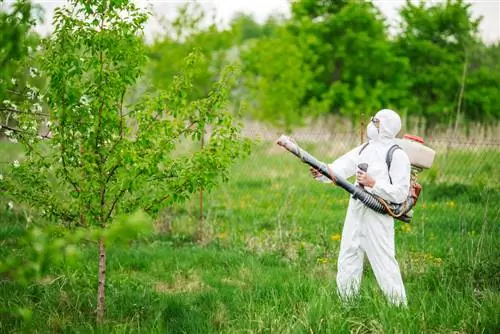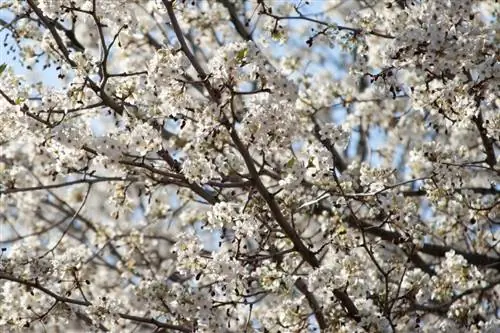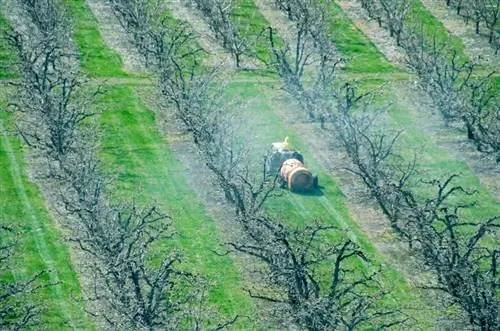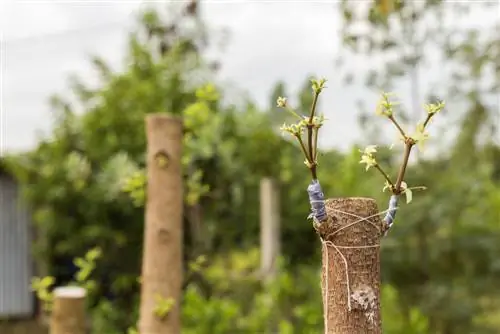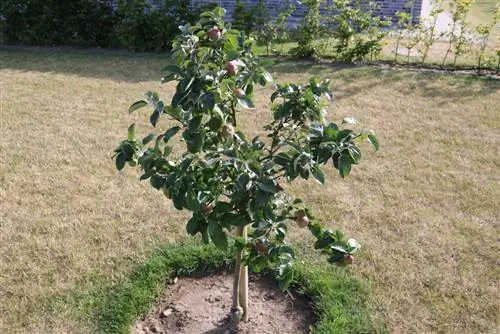- Author admin leonars@hobbygardeners.com.
- Public 2023-12-16 16:46.
- Last modified 2025-01-23 11:21.
Highly toxic substances such as DDT, lindane, E 605 and mercury were also sprayed into private gardens well into the 1970s and 1980s, until the legislature finally withdrew the emergency brake and numerous dangerous active ingredients from circulation. Today, only a very limited number of agents and active ingredients are approved for use in homes and allotments. Furthermore, hobby gardeners often work with plant extracts they have prepared themselves.
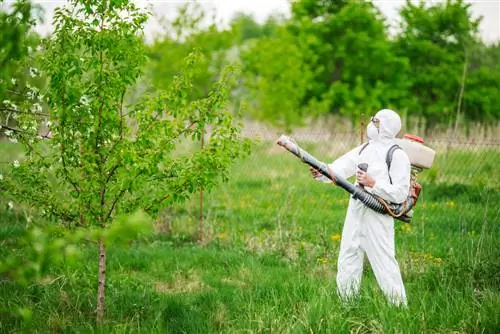
How should you spray fruit trees?
To spray fruit trees, chemical pesticides or self-prepared plant extracts can be used carefully. Make sure you use products that are safe for bees and follow safety rules when applying them. Field horsetail, nettle, tansy or garlic cloves are suitable for plant extracts.
Use chemical pesticides wisely
Even if most of the resources approved for hobby gardening can now be used without major concerns, restraint is still advisable. No remedy that is supposed to work can be completely harmless. If used carelessly, some products can cause skin or eye irritation or even severe allergic reactions. If used improperly, even severe poisoning cannot be ruled out. Therefore, only use all plant protection products exactly according to the instructions and keep them safe for children.
Choose products that are safe for bees
Many chemical pesticides not only work against unwanted pests, but also against beneficial insects such as bees. Therefore, pay attention to the label on the plant protection products: products that are harmful to bees must never be sprayed on flowering plants, not even on weeds. But even products that are safe for bees have their pitfalls: Only spray them outside of the main flight season, because simply spraying them with water causes bees to become hypothermic and unable to fly.
Rules for safe application
In order to apply chemical pesticides safely, please follow these rules:
- Only use products approved for home or allotment gardens.
- Read the instructions carefully and follow them meticulously.
- Wear protective clothing.
- Only spray when there is no wind.
- Keep the specified minimum distances from bodies of water.
- Please note the waiting times.
- Always keep pesticides out of the reach of children.
- Dispose of the leftovers as hazardous waste, never with household waste.
Treat fruit trees with self-made plant extracts
As we now know, plants know how to defend themselves against pathogens and pests with various ingredients. You can take advantage of this by using home-made extracts and herbal tonics.
How to make your own plant extracts
You can get the raw materials for your plant extracts in your own garden, in nature or in the pharmacy. The plants used can be processed into an ecological crop protection product in these ways:
- Broth: First soak the chopped plant parts in cold water for 24 hours and then let them simmer for half an hour.
- Tea: Pour boiling water over the fresh or dried plant parts and let them steep for 10 to 15 minutes.
- Extract: Place the plant parts in cold water for two to three days.
- Manure: Add plenty of water to the plant parts and place the container in a sunny place. Stir daily and add some rock dust to eliminate odors. After the formation of bubbles and foam has subsided, the manure is ready for use.
The preparations described are used diluted or undiluted depending on the intended use. To ensure that the products (€117.00 on Amazon) stick better, add some soft soap (ideally potassium soap).
Overview: Which herb helps against what
The rule of thumb is to add 100 to 150 grams of fresh or 10 to 20 grams of dried herb to one liter of water.
| Plant type | Preparation | Usage | Dilution |
|---|---|---|---|
| Field horsetail | Broth, manure | Mushrooms, spider mites | 1:5 |
| Stinging Nettle | Extract, manure | Aphids, whiteflies | Manure 1:10 |
| Eagle and Worm Fern | Manure | Aphids, scale insects, snails | 1:10 |
| Eagle and Worm Fern | Manure | Mushrooms | undiluted |
| tansy | Broth, manure | various pests | undiluted |
| Yarrow | Excerpt | Mushrooms | 1:10 |
| Onion peels | Manure | Mushrooms | 1:10 |
| Garlic cloves | Tea | Fungi, bacteria | undiluted |
Tip
Make your garden insect and bird friendly so that these beneficial insects keep the harmful animals away from you in a completely natural way.

